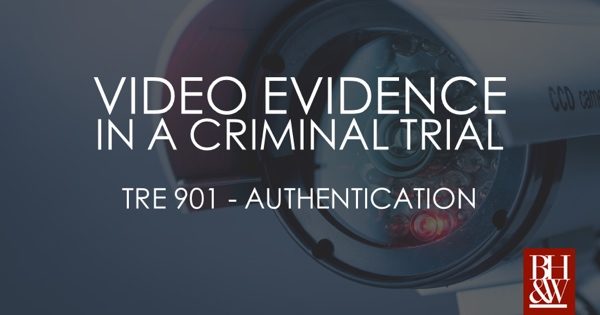New CCA Opinion – Watkins v. State – Clearly Interprets the Duty of the State in Discovery.
 Prosecutors in Texas must disclose almost all of the evidence in their possession to the defense. Disclosure is the rule and not the exception in Texas.1 Section 39.14(a) of the Texas Code of Criminal Procedure requires the prosecution to disclose anything that “constitutes or contains evidence material to any matter involved in the action. . .”2
Prosecutors in Texas must disclose almost all of the evidence in their possession to the defense. Disclosure is the rule and not the exception in Texas.1 Section 39.14(a) of the Texas Code of Criminal Procedure requires the prosecution to disclose anything that “constitutes or contains evidence material to any matter involved in the action. . .”2
The Texas Court of Criminal Appeals in Watkins v. State (see opinion HERE) recently interpreted the word “material” to mean the equivalent of “relevant,” while interpreting the phrase, “any matter involved in the action,” as covering “any number of subsidiary issues impacting the outcome of the proceedings.”3 This interpretation requires Texas prosecutors to disclose virtually all of the evidence in their possession—more than they are mandated to under the federal Constitution as interpreted by the Supreme Court in Brady v. Maryland. In fact, for some types of evidence, the statute does not require the evidence to meet any materiality requirement.4 According to § 39.14(h), evidence tending to negate the guilt or mitigate the punishment of a defendant must be disclosed, regardless of whether the evidence is considered material or requested by the defense.5
Article 39.14 and the case law that accompanies it effectively establish an open-file policy between the prosecution and defense. As the Watkins court put it: “[w]ith the exception of privileged evidence and evidence specifically covered by other statutory provisions, the only obstacle to disclosure of evidence not [exculpatory in nature] is the lack of a specific request.”6
The “materiality” language that the Watkins court addressed is actually language that was carried over from a previous version of Article 39.14—language with its own case law that prosecutors and trial courts carried into practice even after the statute was amended.
How did Prosecutors Interpret 39.14 Before Watkins?
The current version of Article 39.14 came about through the Michael Morton Act, signed into law by Governor Perry in 2013. This bill was a response to the case of Michael Morton, a man wrongfully convicted for the murder of his wife in 1987 after the prosecutor in that case withheld evidence that could have proven his innocence. Morton was exonerated in 2011 after DNA evidence revealed that someone else committed the murder, and the state legislature took up the task of passing a complete overhaul of discovery procedure in Texas.
Because the same language— “material to any matter involved in the action”—was retained by the Morton amendments, confusion persisted among some attorneys about whether the pre-Morton “materiality” jurisprudence is properly attributed to the new, post-Morton version of Article 39.14. However, as the Watkins court addressed, those pre-Morton cases never actually spoke to the issue of what “material” actually meant.7
The Confusion Surrounding “Material”
You see, the pre-Morton Article 39.14 gave trial courts the discretion whether to order the prosecution to disclose evidence upon a motion showing good cause from the defense.8 The pre-Morton “materiality” jurisprudence was inextricably linked with the standard for determining whether a trial court abused its discretion in refusing to issue such an order, and it did not have anything to do with the phrase, “material to any matter involved in the action.”9
The standard for determining whether a trial court abused its discretion in this way was whether the judge’s ruling deprived the defendant of access to evidence that was material to the defendant’s defense.10 “Material,” in this sense, was defined “’under Texas law in the due process terms employed by the Supreme Court in United States v. Agurs.’”11 This meant that a trial judge abused his or her discretion in refusing to order the disclosure of evidence when it was exculpatory in nature.12
Watkins Clearing Things Up
As we now know, the procedure that discovery followed before the Morton amendments was completely removed from Article 39.14, and the “materiality” jurisprudence that was tied to it went out the door as well.13 Because of the confusion that accompanied the judicial use of similar language in close contexts pre-Morton, it is understandable if some prosecutors may have—before Watkins—interpreted the, “material to any matter involved in the action,” language as being loaded with the pre-Morton jurisprudence. Other prosecutors, as shown in Watkins below, applied their own limiting interpretations to the language.
In Watkins, the defense counsel sent a discovery request to the prosecutor pursuant to § 39.14 asking for, “any other tangible things not otherwise privileged that constitute or contain evidence material to any matter involved in the case.”14 He “also requested notice of the State’s intent to offer any extraneous offenses, which the prosecution provided.”15 Watkins was convicted of second-degree possession of a controlled substance, and during the punishment phase of trial, the state sought to introduce 34 exhibits for the purpose of proving up Watkins’ prior felony convictions for enhancement purposes.16 The defense objected—the prosecutor did not disclose the exhibits to the defense because he did not believe Article 39.14 applied to punishment.17 The Trial court overruled the objection, allowing the evidence to be admitted.18
The issue surrounding the prosecution’s non-disclosure eventually worked its way up to the Court of Criminal Appeals, where the Watkins court seized the opportunity to review the requirements of Article 39.14 in light of the Michael Morton Act amendments. In short, the Court laid out the history of Article 39.14 explained above, and it clearly established that Texas now has disclosure requirements that track the spirit of the Michael Morton Act.19
[1] Watkins v. State, NO. PD-1015-18 (Tex. Crim. App. 2021).[2] Tex. Code Crim. Proc. Ann. art. 39.14(a) (West 2017).
[3] Watkins, at 24-25.
[4] Tex. Code Crim. Proc. Ann. art. 39.14(h) (West 2017).
[5] Id.
[6] Watkins, at 23.
[7] Id. at 35.
[8] TEX. Code Crim. Proc. art. 39.14 (2009).
[9] Watkins at 35.
[10] Id. at 41-42.
[11] Id. at 40 (quoting United States v. Agurs, 427 U.S. 97 (1976)).
[12] Id. at 41.
[13] See generally Watkins.
[14] Watkins at 4.
[15] Id.
[16] Id.
[17] Id.
[18] Id. at 5.
[19] See generally Watkins.










